Joseph Jaekel

Joseph Jaekel (born April 23, 1907 in Wallmenroth , Siegerland , † July 19, 1985 in Cologne ) was a German metal sculptor and university professor .
life and work
He grew up as one of four children of a Cologne teacher and an entrepreneur's daughter from Siegerland. When he was two years old, the family moved to Cologne in the Müngersdorf district . He gave up the plan to become a Catholic missionary , which was shaped by the very religious family at home , left the Knechtsteden convent school near Dormagen at the age of 17 and turned to the fine arts and handicrafts . From 1924 to 1929 Jaekel received his artistic training at the Cologne Werkschulen , the place where he later worked. His teachers included professors Schmidthuber, Riemerschmid and Hans Wissel , whose class for metal driving he was to take over, and was appointed master class . Even as a student, he specialized in driving work in copper and brass . From 1930 he worked as a freelance metal sculptor and created sacred commissioned works such as chalices, crucifixes , tabernacle doors and church portals, but also secular works, mostly human and animal figures. In 1938 he married Mia (My) Türner, who became his assistant, secretary and model throughout his life. In 1940 Jaekel was drafted into the military, but shortly afterwards released because of latent pulmonary tuberculosis (his three siblings died from it at a young age). Bombed out, the couple moved to their in-laws in Linz on the Rhine until the end of the war .
After the end of the war, Jaekel resumed his artistic activity in Cologne and in 1947 became head of the metal sculpture department at the Cologne factory schools. In 1954 he became the father of a daughter. During the 1950s he made a name for himself in addition to his art education work and his metal sculpting work, above all with wall sculptures in public spaces ("art in architecture"). Professor under the directorship of the painter Friedrich Vordemberge he was appointed deputy director in 1964, 1970 by Westphalia North Rhine- Minister of Culture to Professor and in 1971 Dean of the Faculty of Art and Design at the newly founded University of Applied Sciences in Cologne . In 1974 he ended his work as a university lecturer. After his retirement he continued to be artistically active until his death. His grave is in the Müngersdorf cemetery, where he has lived since 1959.
Joseph Jaekel was a member of the German Association of Artists .
Works
Some of his metal sculptures and sculptures are in public spaces (e.g. Cologne Rheinpark , Düsseldorf Higher Regional Court , Federal Maritime and Hydrographic Agency in Hamburg-St. Pauli ).
Churches:
- St. Agatha in Wipperfürth- Agathaberg (Easter candlestick)
- St. Albertus in Mönchengladbach
- St. Joseph in Cologne-Dellbrück (altar, crucifix, candlestick)
- St. Lambertus in Erkelenz
- St. Nikolaus in Düren- Rölsdorf
- Maria Laach Abbey (bronze portal, so-called "Paradise Gate")
Works are represented in numerous museums, especially in the Rhineland: u. a. Museum Morsbroich in Leverkusen , Suermondt-Ludwig-Museum in Aachen .
Jaekel designed the first ballot box made of gold-colored brass for the German Bundestag , into which the ballot papers for Konrad Adenauer's election as the first German Chancellor were thrown on September 15, 1949 .
A large part of his artistic estate is in Moyland Castle in Bedburg-Hau , u. a. in the local sculpture park. His written estate has been kept in the historical archive of the City of Cologne since 1988 .
Web links
- Literature by and about Joseph Jaekel in the catalog of the German National Library
- Written estate of Joseph Jaekel in the historical archive of the city of Cologne
- Detailed biography with sources and additional literature on the website of the Cologne-Müngersdorf Citizens' Association
Individual evidence
- ↑ kuenstlerbund.de: Full members of the German Association of Artists since it was founded in 1903 / Jaekel, Josef ( Memento of the original from March 4, 2016 in the Internet Archive ) Info: The archive link has been inserted automatically and has not yet been checked. Please check the original and archive link according to the instructions and then remove this notice. (accessed on September 1, 2015)
- ↑ Divided Germany: Founding Years Way West - The first ballot box of the German Bundestag, designed by Joseph Jaekel
| personal data | |
|---|---|
| SURNAME | Jaekel, Joseph |
| ALTERNATIVE NAMES | Jaekel, Josef |
| BRIEF DESCRIPTION | German metal sculptor and university professor |
| DATE OF BIRTH | April 23, 1907 |
| PLACE OF BIRTH | Wallmenroth , Siegerland |
| DATE OF DEATH | July 19, 1985 |
| Place of death | Cologne |
